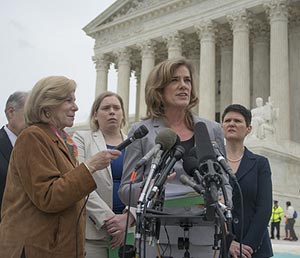WASHINGTON—Missouri acted properly in denying public funds to a Lutheran church that wanted the state to pay for improvements to its playground, an attorney with the Baptist Joint Committee for Religious Liberty insisted.
Holly Hollman, general counsel for the Baptist Joint Committee, filed a friend-of the-court brief in the case of Trinity Lutheran Church v. Comer.
“This case is about whether the state has to pay for the property improvements of a church, despite nearly 200 years of precedent and many practical considerations that argue otherwise,” Hollman said.
Grant sought for improvements to child learning center playground
The case centers on a Missouri congregation that sought funds for its child learning center from a state program that awards a limited number of grants for playground improvements.
 Holly Hollman, general counsel for the Baptist Joint Committee, offers public statements urging the Supreme Court to uphold a lower court ruling that Missouri rightly denied a Lutheran church access to a state grant to renovate its playground. (BJC Photo)The Missouri constitution states, “no money shall ever be taken from the public treasury, directly or indirectly, in aid of any church, sect or denomination of religion.”
Holly Hollman, general counsel for the Baptist Joint Committee, offers public statements urging the Supreme Court to uphold a lower court ruling that Missouri rightly denied a Lutheran church access to a state grant to renovate its playground. (BJC Photo)The Missouri constitution states, “no money shall ever be taken from the public treasury, directly or indirectly, in aid of any church, sect or denomination of religion.”
“Missouri has drawn the right line to protect against the government funding of religious exercise,” Hollman said, noting the constitutional prohibition on state aid to churches is a protection of religious liberty drawn from hard-learned historical lessons.
“Baptists and other religious dissenters in colonial America fought to ensure that the coercive power of the government was not used to force taxpayers to pay for churches,” she said. “The result has been a rich flowering of religion and religious institutions, funded by voluntary gifts and offerings.”
Church claims discrimination based on religion
The church—represented by Alliance Defending Freedom—argued it should be eligible for the state grant because the playground materials are secular, and the congregation operates a preschool open to children in its area, regardless of their religious affiliation.
“The safety of all children matters, whether they attend a religious school or a nonreligious school,” said David Cortman, senior counsel for Alliance Defending Freedom. “The state of Missouri denied the Trinity Lutheran Child Learning Center’s access to a public program that would have made their playground safer—and did so on the basis of religious status, a direct violation of the U.S. Constitution and Supreme Court precedent.”
Last year, the Southern Baptist Convention’s Ethics & Religious Liberty Commission filed a brief in opposition to the lower court rulings that upheld Missouri’s decision to deny the state grant to the church-based daycare.
“Missouri’s express discrimination against religion should be declared unconstitutional,” the brief said.
The case “is about maintaining that long-held American principle that state neutrality toward religion does not mean state hostility toward religious people,” ERLC President Russell Moore said.
‘A necessary protection for religious liberty’
Hollman rejected the idea the state discriminated against the church center by denying it access to the grant.
“Though there are many ways that religion and government cooperate, it is a fundamental principle of religious liberty in this country that the government does not fund religious exercise. Churches are, by definition, expressions of religion—organized for religious exercise,” she insisted. “That’s why churches are, and should be, given special treatment. It is a necessary protection for religious liberty, not a mark of hostility or discrimination against religion.
“Religion has a special place in our constitutional tradition, a place that is protected by separating the institutions of religion and government. The U.S. Supreme Court has never upheld direct government grants to churches, much less required a state to provide such funding.”















We seek to connect God’s story and God’s people around the world. To learn more about God’s story, click here.
Send comments and feedback to Eric Black, our editor. For comments to be published, please specify “letter to the editor.” Maximum length for publication is 300 words.